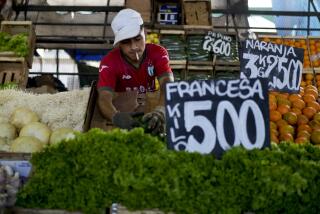Leaders Exhibit Air of Confidence
- Share via
BUENOS AIRES — As Brazil withstood another roller-coaster day of economic crisis Friday, policymakers in Argentina, one of its top trading partners and a potential domino if the crisis spreads, projected the air of calm and the discipline that has characterized their approach in recent years.
“Amid the bad news from Brazil, our foreign reserves are strong, our credits are good and there is confidence in the Argentine currency,” said Rogelio Frigerio, secretary of economic programming. “No one remotely imagines that Argentina would devalue or change the rules of the game. We have been through worse crises before and we haven’t changed them.”
Certainly Argentina, with South America’s second-biggest economy, will suffer if Brazil sinks into chaos. Brazil is one of the most important customers for Argentine cars and commodities, so the plunge of the Brazilian real will hurt Argentine exporters and workers. The repercussions have caused interest rates to rise here, further squeezing the continent’s largest middle class at a time of economic slowdown.
Argentina also suffers from generalized skittishness on the part of investors toward emerging nations, though Argentine stock markets here mirrored Friday’s high-powered rebound in Brazilian stocks, surging more than 12%.
But overall, Brazil’s otherwise hellish week of volatile devaluations and billion-dollar capital flight presents a stark contrast to its southern neighbor’s rock-like economic infrastructure.
Argentina’s strict currency policy ties its peso to the dollar. Unlike Brazil, Venezuela, Mexico and other nations, Argentina has resisted pressures to devalue throughout the 1990s. A strong banking sector and the government’s fiscal orthodoxy have shielded Argentina from the turbulence shaking many Latin and Asian nations.
“In the region, Argentina enjoys long-term fiscal consistency and solid financial solvency, along with Chile,” said Abel Viglione, a senior economist at the Foundation for Latin American Economic Research.
But Argentina has been tarnished by the same brush as all emerging markets since the collapse of Asian markets in 1997 spread around much of the world.
“Argentina had been able to sell itself as a credible market. [But] it suffers from investor association,” a U.S. diplomatic source said.
Even before this week’s turmoil, Argentine policymakers warned that 1999 looked lean compared with a decade of yearly growth rates as high as 7%. They reduced their prediction of 4% growth for this year to 3% after the October scare in Brazil, while holding out hope for a midyear recovery.
“That was a conservative goal and we still think we can meet it,” Frigerio said.
Private analysts, on the other hand, had predicted a slowdown or outright recession, projecting growth at between 2% and zero. They will probably now revise those projections downward, according to diplomatic and private- sector experts.
The hardest-hit sectors will be manufacturing and agriculture because Brazil takes about 30% of Argentine exports, such as automobiles, meat and milk.
The damage will probably not be calamitous, however, because trade only accounts for about 8% of Argentina’s gross national product.
The serenity of Argentine leaders reflects an international consensus that, despite ills such as unemployment and inequality, Argentina has left behind the era of devaluation, inflation and accompanying frenzy that marked the 1980s here and is battering Brazil’s attempt at modernization.
* CURRENCY DEVALUED
Brazil allows the real to float freely, raising economic uncertainty in emerging markets and in the U.S. A1
* WALL STREET SURGES
Bolstered by Brazil’s move, U.S. stocks rallied to snap a four-day losing streak, with the Dow soaring 219 points. C2
(BEGIN TEXT OF INFOBOX / INFOGRAPHIC)
Latin Markets: Long Road Back
While Latin American stock markets rallied Friday after Brazil’s decision to end its costly defense of its beleaguered currency, markets in the region are still far below their peaks. Monthly closes since 1994 of Mexico’s Bolsa index and Argentina’s Merval, and latest:
Mexico’s Bolsa
Friday: 3,617.77
*
Argentina’s Merval
Friday: 382.37
3,617.77
Source: Bloomberg News
More to Read
Sign up for Essential California
The most important California stories and recommendations in your inbox every morning.
You may occasionally receive promotional content from the Los Angeles Times.










